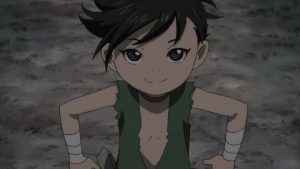 Without a question, last week’s episode of Dororo (really, the entire Mio mini-arc) was a crushingly depressing piece of work in the best possible way. It’s not possible to produce that degree of pathos without a tremendously high level of writing, which this series clearly has – obviously in terms of source material (it’s Tezuka for cripes’ sake) but also in terms of the adaptation by Kobayashi Yasuko. He’s a vital part of this equation, because Tezuka’s original manga is both relatively short and unfinished. Kobayashi is going to have to fill in a lot of blanks, and so far he’s provided two mostly original episodes – the magnum opus #3 (Jukai’s backstory) and this one.
Without a question, last week’s episode of Dororo (really, the entire Mio mini-arc) was a crushingly depressing piece of work in the best possible way. It’s not possible to produce that degree of pathos without a tremendously high level of writing, which this series clearly has – obviously in terms of source material (it’s Tezuka for cripes’ sake) but also in terms of the adaptation by Kobayashi Yasuko. He’s a vital part of this equation, because Tezuka’s original manga is both relatively short and unfinished. Kobayashi is going to have to fill in a lot of blanks, and so far he’s provided two mostly original episodes – the magnum opus #3 (Jukai’s backstory) and this one.
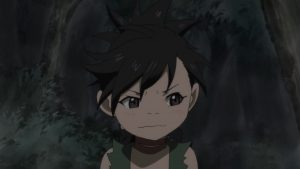 While he’s as experienced a screenwriter as you could want, to be honest I haven’t always loved Kobayashi’s work – but so far he’s hitting a home run here. This ep was not as devastating as #3 or last week, but I don’t think you’re going to want every episode to be an emotional wrecking ball like Mio’s arc was. That Dororo is a tragedy and Hyakkimaru a tragic figure is pretty much established by now, but if all you got was tragedy every week it would soon lose much of its emotional impact. And you have to believe there’s some hope for redemption in this world, or there’s no point in enduring all that existential pain.
While he’s as experienced a screenwriter as you could want, to be honest I haven’t always loved Kobayashi’s work – but so far he’s hitting a home run here. This ep was not as devastating as #3 or last week, but I don’t think you’re going to want every episode to be an emotional wrecking ball like Mio’s arc was. That Dororo is a tragedy and Hyakkimaru a tragic figure is pretty much established by now, but if all you got was tragedy every week it would soon lose much of its emotional impact. And you have to believe there’s some hope for redemption in this world, or there’s no point in enduring all that existential pain.
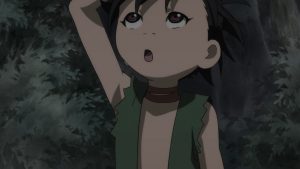 That brings us to this episode, which is an altogether more optimistic take on the state of the world. We’ve met good people in every arc, and Hyakkimaru and Dororo are certainly sympathetic protagonists, but events haven’t exactly supported a positive world view. It seems as if we’re headed for another dark tale when those two stumble upon a youkai in the woods – a giant spider who’s in the process of feeding on a human victim. They intervene and after a short skirmish which ends with Hyakkimaru being wrapped in spider silk, the youkai escapes and Dororo and Hyakkimaru eventually find a small mountain village with armed sentries posted because of a sting of “kidnappings”.
That brings us to this episode, which is an altogether more optimistic take on the state of the world. We’ve met good people in every arc, and Hyakkimaru and Dororo are certainly sympathetic protagonists, but events haven’t exactly supported a positive world view. It seems as if we’re headed for another dark tale when those two stumble upon a youkai in the woods – a giant spider who’s in the process of feeding on a human victim. They intervene and after a short skirmish which ends with Hyakkimaru being wrapped in spider silk, the youkai escapes and Dororo and Hyakkimaru eventually find a small mountain village with armed sentries posted because of a sting of “kidnappings”.
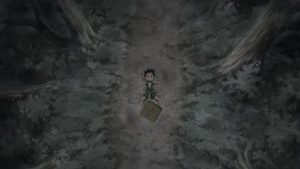 It’s fairly clear from the beginning that something is odd about this whole setup – and with Yajiro (Komatsu Fumimori), the human man who finds the youkai (now in human-ish form) passed out by the side of the road and takes her home. He promptly names her Ohagi after the bed of flowers in which he found her, feeds her and provides her with a warm place to sleep. As Ohagi (Kaida Yuko) notes, Yajiro is a strange fellow. He works during the day and again in the middle of the night, and seems undisturbed by Ohagi’s odd manner of speech. He seems to suspect her true nature fairly early on, but doesn’t change his attitude towards Ohagi in the slightest.
It’s fairly clear from the beginning that something is odd about this whole setup – and with Yajiro (Komatsu Fumimori), the human man who finds the youkai (now in human-ish form) passed out by the side of the road and takes her home. He promptly names her Ohagi after the bed of flowers in which he found her, feeds her and provides her with a warm place to sleep. As Ohagi (Kaida Yuko) notes, Yajiro is a strange fellow. He works during the day and again in the middle of the night, and seems undisturbed by Ohagi’s odd manner of speech. He seems to suspect her true nature fairly early on, but doesn’t change his attitude towards Ohagi in the slightest.
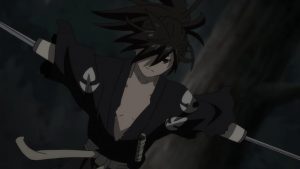 The pattern recurring here is pretty straightforward – for all that they can be deadly and they certainly prey on humans’ dark impulses, youkai aren’t the real villains of this piece. In fact there are no kidnappings going on in this village – in effect, the villagers are being kept as a captive workforce by the local lord (the village exists because of its quarry). The sentries aren’t there to keep beasts out, but villagers in – and Yajiro’s midnight labor is helping them escape through a hidden passage in the mountains. For Yajiro it doesn’t matter whether it’s human, youkai or insect (it’s no coincidence Kobayashi used a cockroach here, the most despised of all insects in Japan), life is precious. And that certainly extends to Ohagi, who has several chances to feed on Yajiro and always restrains herself.
The pattern recurring here is pretty straightforward – for all that they can be deadly and they certainly prey on humans’ dark impulses, youkai aren’t the real villains of this piece. In fact there are no kidnappings going on in this village – in effect, the villagers are being kept as a captive workforce by the local lord (the village exists because of its quarry). The sentries aren’t there to keep beasts out, but villagers in – and Yajiro’s midnight labor is helping them escape through a hidden passage in the mountains. For Yajiro it doesn’t matter whether it’s human, youkai or insect (it’s no coincidence Kobayashi used a cockroach here, the most despised of all insects in Japan), life is precious. And that certainly extends to Ohagi, who has several chances to feed on Yajiro and always restrains herself.
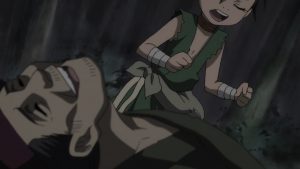 The real question here, then, is what Hyakkimaru is going to do when he finally catches up the youkai, as we know he eventually will. Dororo learns of a reward for the capture of the kidnapper, which he not unreasonably assumes is Ohagi, but Hyakkimaru clearly isn’t driven by such concerns. When the moment finally comes it’s when Yajiro is leading Ohagi to his escape path in the mountains, and the lord’s men catch up at the same time and learn the truth of what he’s been doing. There’s no turning back now – everyone has to pick a side and act on it.
The real question here, then, is what Hyakkimaru is going to do when he finally catches up the youkai, as we know he eventually will. Dororo learns of a reward for the capture of the kidnapper, which he not unreasonably assumes is Ohagi, but Hyakkimaru clearly isn’t driven by such concerns. When the moment finally comes it’s when Yajiro is leading Ohagi to his escape path in the mountains, and the lord’s men catch up at the same time and learn the truth of what he’s been doing. There’s no turning back now – everyone has to pick a side and act on it.
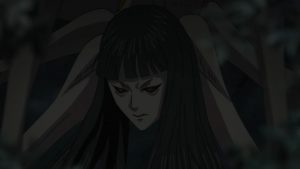 A couple of fascinating elements stand out in this final confrontation. It’s Hyakkimaru’s ears which allow him to hear Yaajiro’s pleas for Ohagi’s life – really for the first time, his recovered body parts actually impact things positively. Also, it’s when he sees the color of Ohagi’s soul change (after she’s subdued the lord’s soldiers) that Hyakkimaru fully stands down and lets her escape with the wounded Ohagi. Finally, as Aniki and Dororo are leaving the village and Dororo (whose nobility is showing through in little ways all the time) spares a spider that’s bitten him, Hyakkimaru not only smiles but laughs – once more a recovered part of himself cast in a positive light, rather than a tragic one. I don’t know if it represents a sea change in Dororo’s overall tone, but it’s certainly a respite.
A couple of fascinating elements stand out in this final confrontation. It’s Hyakkimaru’s ears which allow him to hear Yaajiro’s pleas for Ohagi’s life – really for the first time, his recovered body parts actually impact things positively. Also, it’s when he sees the color of Ohagi’s soul change (after she’s subdued the lord’s soldiers) that Hyakkimaru fully stands down and lets her escape with the wounded Ohagi. Finally, as Aniki and Dororo are leaving the village and Dororo (whose nobility is showing through in little ways all the time) spares a spider that’s bitten him, Hyakkimaru not only smiles but laughs – once more a recovered part of himself cast in a positive light, rather than a tragic one. I don’t know if it represents a sea change in Dororo’s overall tone, but it’s certainly a respite.
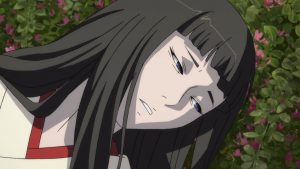 There’s one other interesting element of this worth mentioning, and that’s the matter of Ohagi’s true nature. Is she being truthful when she tells Yajiro that she never kills men, only depletes their life force (which eventually recovers), or is she merely trying to prevent him from loathing her as a killer? I’m not sure it’s possible to answer that with certainty based on what we saw here, though I feel pretty confident that her feelings for Yajiro are genuine and she certainly wouldn’t kill him. What I suspect is based on two things – the fact that she ate the fly that landed on her rice, and that her soul’s color was red (which seems to signify killing intent) until Hyakkimaru saw it change at the very end. And that is that while what she told Yajiro was a lie, seeing his respect for life changed her, and she’s resolved to avoid killing from now on.
There’s one other interesting element of this worth mentioning, and that’s the matter of Ohagi’s true nature. Is she being truthful when she tells Yajiro that she never kills men, only depletes their life force (which eventually recovers), or is she merely trying to prevent him from loathing her as a killer? I’m not sure it’s possible to answer that with certainty based on what we saw here, though I feel pretty confident that her feelings for Yajiro are genuine and she certainly wouldn’t kill him. What I suspect is based on two things – the fact that she ate the fly that landed on her rice, and that her soul’s color was red (which seems to signify killing intent) until Hyakkimaru saw it change at the very end. And that is that while what she told Yajiro was a lie, seeing his respect for life changed her, and she’s resolved to avoid killing from now on.


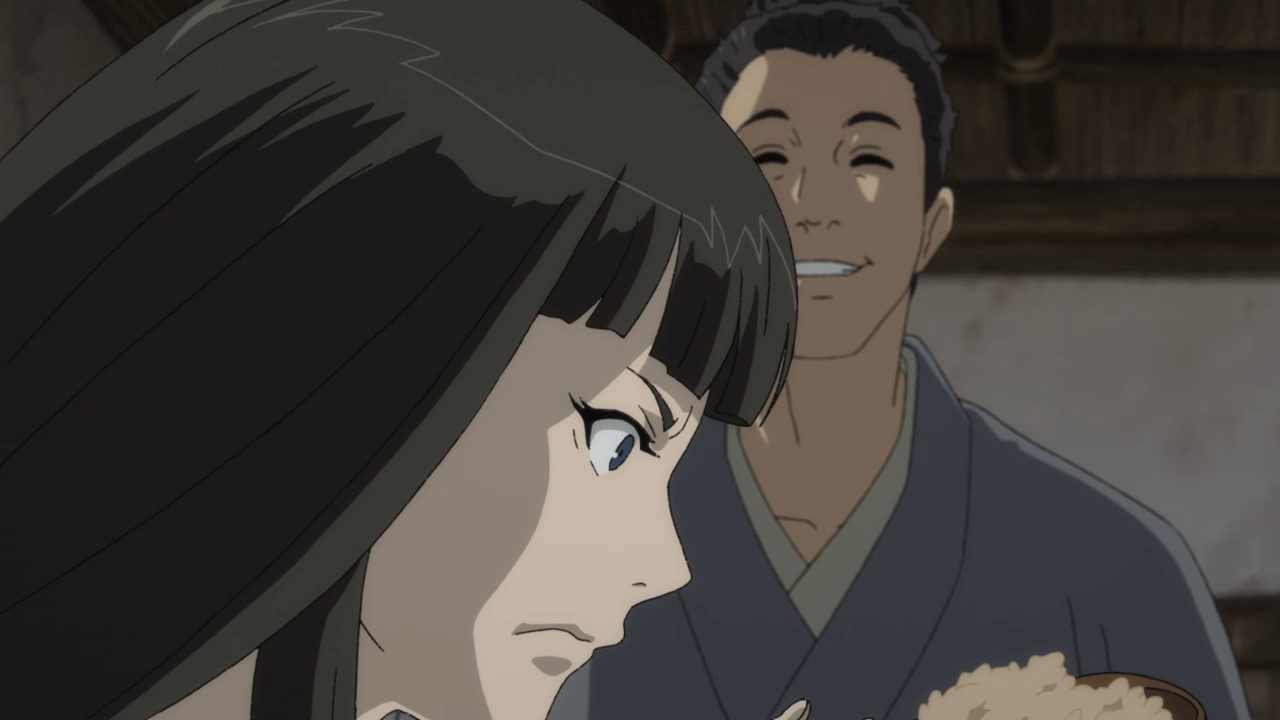
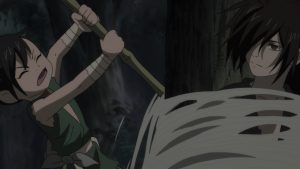
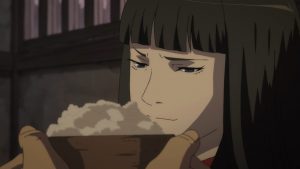
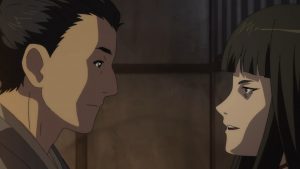
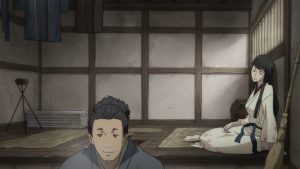
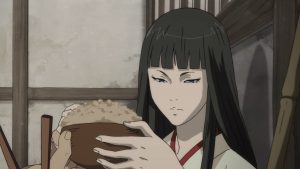
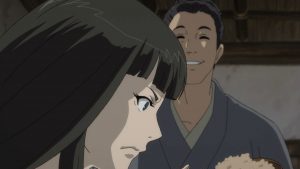
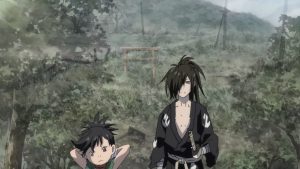
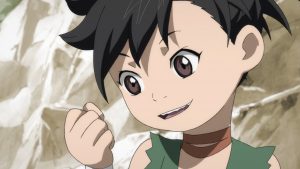
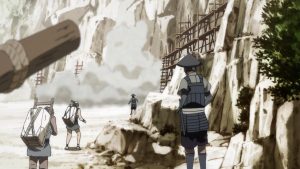
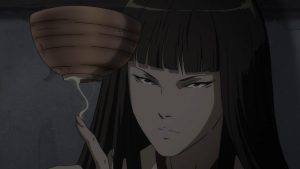
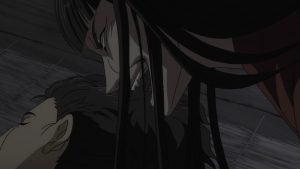
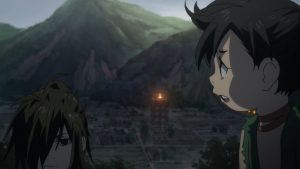
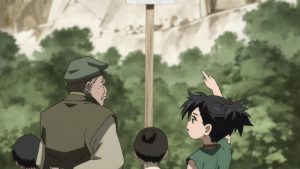
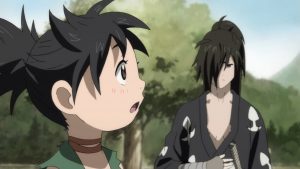
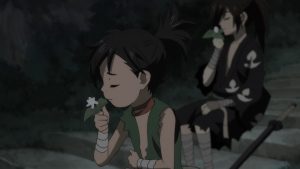
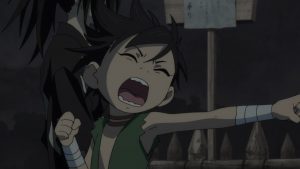
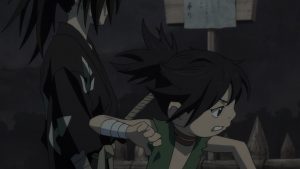
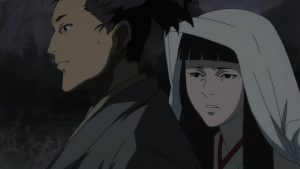
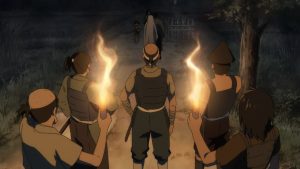
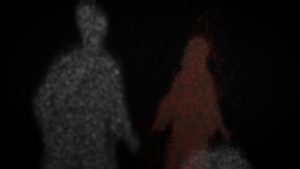
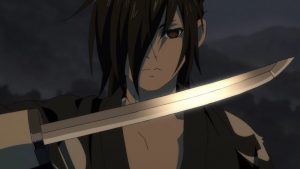
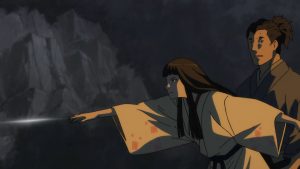
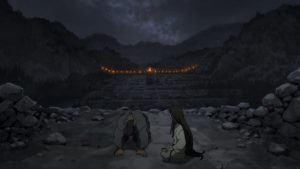
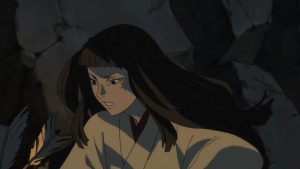
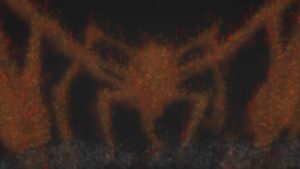
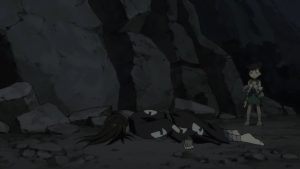
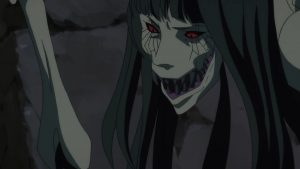
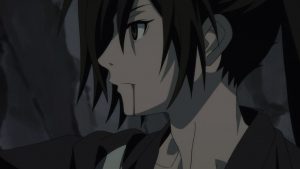
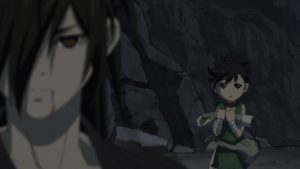
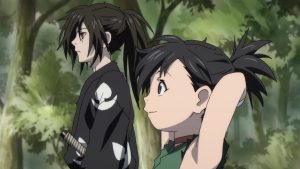
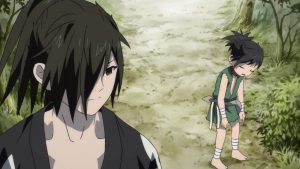
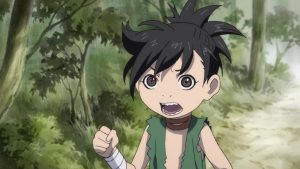
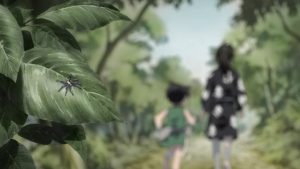
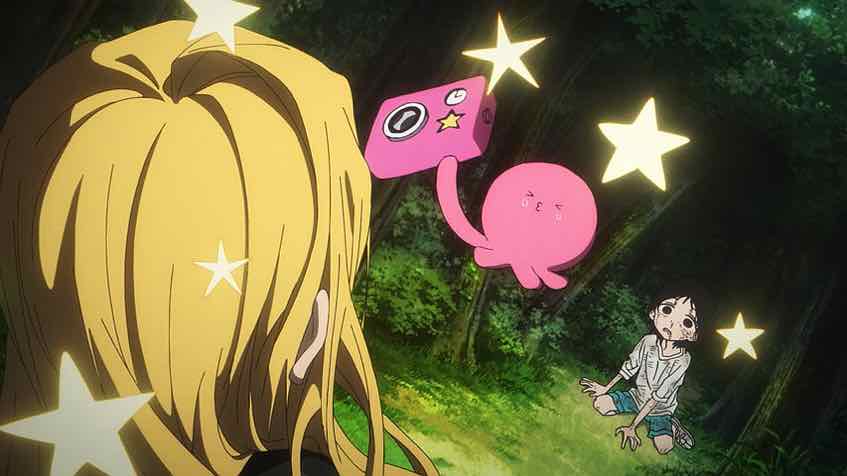
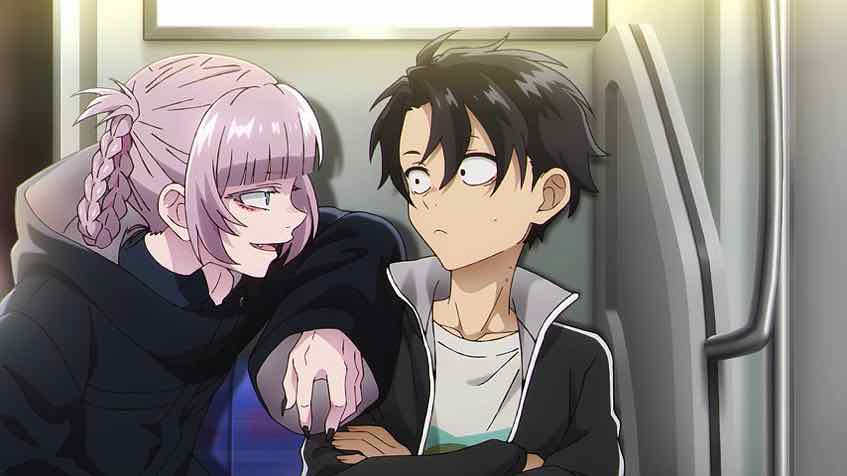
DauntingOverlord
February 20, 2019 at 4:29 pmI enjoyed this breather, especially after the previous two episodes. I do sort of wish there was a better explanation as to what separates random ghouls and the demons Hyakkimaru has to kill. Sometimes it confuses me, but I know it’s just a nitpick.
A.Sade
February 21, 2019 at 1:02 amGeneral consensus seems to be that this episode was slightly weaker, and the number of comments here seems to reflect that too. I can’t say it kept me on the edge of my seat as the last episode did, but it would be tiring to stay that strung-up all the time. I will say, as much as I love every second Hyakki is on screen and would like more of him, it was very interesting to see our protagonists framed as almost villains for the most part here. Until the very end, I was still holding my breath for the inevitable clash. Not bad for a breather episode then.
Guardian Enzo
February 21, 2019 at 7:38 amThat’s the salient thing for me – you just don’t want to sustain that level of intensity every week for a two cour series. I thought this episode was a welcome change in tone and totally consistent with the rest of the series thematically.
bnbros
February 21, 2019 at 3:00 pmI’ll be honest though, I was mildly disappointed that there wasn’t much follow-up to last week aside from the shot of Hyakkimaru still clutching onto the bag of paddy seeds. I was expecting something like a scene of the surviving samurai reporting to Daigo as further foreshadowing to the future conflict.
Guardian Enzo
February 21, 2019 at 3:26 pmJust because there was no follow-up this week doesn’t mean there won’t be follow-up. Don’t forget, the Mio arc is manga material and the Ohagi story is anime original. We may still get the follow-up later.
That said, sometimes a series will just leave a story like that open-ended, preferring to let the audience write the follow-up in their mind’s eye. Hell, I wanted Picard to play that damn flute every week but they only brought it back one time.
bnbros
February 22, 2019 at 6:32 pmYea, I get that. Don’t get me wrong though, I too liked that this episode was a nice breather from the previous ones but I can’t shake off the feeling that it somehow felt a bit weaker than usual.